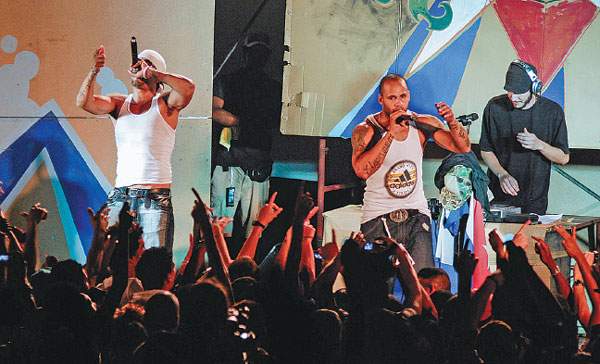US uses hip-hop to subvert Cuba
Agency infiltrates music scene to attack nation's political system
For more than two years, a US agency secretly infiltrated Cuba's underground hip-hop movement, recruiting unwitting rappers to spark a youth movement against the government, according to documents obtained by The Associated Press.
The idea was to use Cuban musicians to build a network of young people seeking "social change", documents show. But the operation was amateurish and unsuccessful.
On at least six occasions, Cuban authorities detained or questioned people involved in the program. They also confiscated computer hardware, and in some cases it contained information that jeopardized Cubans who likely had no idea they were caught up in a clandestine US operation. Still, contractors working for the US Agency for International Development kept putting themselves and their targets at risk, the AP investigation found.
The program is laid out in documents involving Creative Associates International, a Washington, DC, contractor paid millions of dollars to undermine Cuba's government. The thousands of pages include contracts, e-mails, preserved chats, budgets, expense reports, power points, photographs and passports.
The work included the creation of a "Cuban Twitter" social network and the dispatch of inexperienced Latin American youth to recruit activists.
"Any assertions that our work is secret or covert are simply false," USAID said in a statement on Wednesday. Its programs were aimed at strengthening civil society.
Creative Associates did not respond to a request for comment.
At first, the hip-hop operation was run in Cuba by Serbian contractor Rajko Bozic. His project was inspired by the protest concerts of the student movement that helped overthrow former Serbian president Slobodan Milosevic in 2000. Nine years later, Bozic headed public relations for Serbia's EXIT Festival, an annual music event that had grown out of the student movement.
Contractors would recruit scores of Cuban musicians for projects disguised as cultural initiatives but really aimed at boosting their visibility and stoking a movement of fans to challenge the government.
Creative used a Panama front company and a bank in Lichtenstein to hide the money trail from Cuba, where thousands of dollars went to fund a TV program starring Cuban hip-hop group Los Aldeanos. It would be distributed on DVDs to circumvent Cuba's censors.
Then the Colombian rock star Juanes announced a September 2009 concert in the heart of Havana. Creative managers held a two-day strategy session on how to persuade Juanes to let Los Aldeanos perform with him.
It didn't happen, but Juanes publicly thanked the rappers after the concert and was photographed with them.
John Reilly, a Juanes spokesman, said on Wednesday that the concert had no political agenda and that "Juanes and the other organizing artists did not have any knowledge" of what others did.
Contractors paid $15,000 to underwrite an arts and music festival put on by the family of Pablo Milanes, the famed singer of "nueva trova" music and a man with close government ties. Their secret aim was to seed "the minds of festival organizers with new ideas" and persuade them to send "high-impact messages" to the audience, read one report.
Milanes' daughter, Suylen Milanes, said government officials showed up the day before the festival and warned her that she was associating with unsavory characters. They even showed her copies of Bozic's e-mails, which they called suspicious, she recalled. Her father declined to comment.
Clearly, Cuban officials had figured out what was going on.
Bozic was detained coming into Havana with equipment, including a potentially incriminating memory stick, generating anxiety among the contractors. He cut his trip short and other contractors were told he wouldn't be returning soon.
Then, Cuban authorities detained a photographer working with Adrian Monzon, the only Cuban who documents show knowingly worked for Creative Associates on the hip-hop program. State security then questioned Monzon, a video jockey. He told Creative that the Cuban authorities were worried about Bozic and suspected links to the CIA.
Four months later, Los Aldeanos left Cuba for their first trip off the island to perform at the EXIT festival in Serbia. On the side, they were the unwitting recipients of leadership training meant "to focus them a little more on their role as agents of social mobilization," wrote Xavier Utset, a long-standing opponent of the Cuban government.
Monzon was detained again returning to Havana in April 2011, his computer and a memory stick seized. When they were returned, he realized they contained a document with the names of two Creative Associates managers.
It was a devastating blow.
Monzon and Utset did not respond to repeated requests for comment. Aldo would only say that his "conscience is clear."
While Bozic spoke with AP about his work with the EXIT festival, he did not respond to requests for comment on his Cuba work.
|
Members of Los Aldeanos, Aldo Rodriguez, left, and Bian Rodriguez, center, were recruited by Rajko Bozic, a Serbian contractor, whose aim was to use bands to foment unrest among young people in Cuba. Associated Press |

























